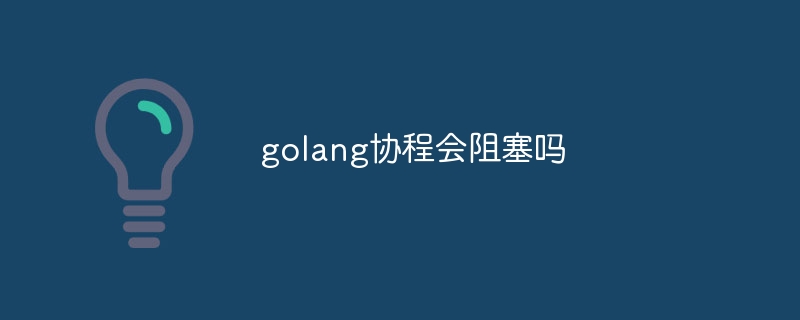
Golang coroutine will block, ways to avoid it: 1. Blocking calls, you can wrap the blocked function in a separate coroutine to run, thereby achieving concurrent execution; 2. Synchronization primitives, when using When using these primitives, the program logic needs to be carefully designed to avoid deadlock or the situation where the coroutine cannot continue to execute; 3. Coroutine leakage requires calling the end function of the coroutine at the appropriate time, such as the "defer" statement or using " context" package to control the life cycle of the coroutine.

The operating environment of this article: Windows 10 system, go1.20 version, DELL G3 computer.
Golang is an open source programming language known for its concurrency performance. It provides a powerful concurrency model called coroutines. A coroutine is a lightweight thread that can run multiple coroutines in the same operating system process to achieve concurrent execution.
Coroutines are widely used in Golang because they have the following advantages:
1. Lightweight: Coroutines are created and destroyed very quickly because they No operating system intervention is required. In contrast, thread creation and destruction require more time and resources.
2. Low overhead: The stack size of a coroutine is usually only a few KB, so a large number of coroutines can be created in the same process. This enables Golang to handle thousands of concurrent requests without running out of resources.
3. Simple and easy to use: Golang provides a simple and intuitive syntax for coroutines. Developers can use the keyword "go" to create a coroutine and the keyword "defer" to ensure proper cleanup of resources.
However, despite these advantages of Golang's coroutine, there are still some situations where the coroutine will be blocked. Let's discuss some common blocking situations and how to avoid them.
1. Blocking call: When the coroutine calls a blocking function, it will wait for the return of the function. This may cause the coroutine to be blocked and unable to continue performing other tasks. To avoid this situation, blocking functions can be wrapped and run in a separate coroutine to achieve concurrent execution.
2. Synchronization primitives: Golang provides some synchronization primitives, such as channels and mutexes. If a coroutine is blocked while acquiring a lock or receiving data from a channel, it will not be able to continue performing other tasks. When using these primitives, the program logic needs to be carefully designed to avoid deadlock or the situation where the coroutine cannot continue to execute.
3. Coroutine leakage: If the coroutine is not properly managed and cleaned up, coroutine leakage may occur. Coroutine leakage means that the coroutine is not ended correctly and is still running in the background and cannot be recycled. This results in wasted resources and degraded performance. In order to avoid coroutine leakage, you need to call the end function of the coroutine at the appropriate time, such as the "defer" statement or use the "context" package to control the life cycle of the coroutine.
To sum up, although Golang's coroutine is efficient and lightweight, there are still some situations where the coroutine will be blocked. To take full advantage of Golang's concurrency performance, developers should avoid making blocking calls in coroutines, use synchronization primitives correctly, and manage and clean up coroutines in a timely manner. Through reasonable design and coding, the advantages of Golang coroutines can be maximized to achieve efficient concurrent execution
The above is the detailed content of Will golang coroutine block?. For more information, please follow other related articles on the PHP Chinese website!